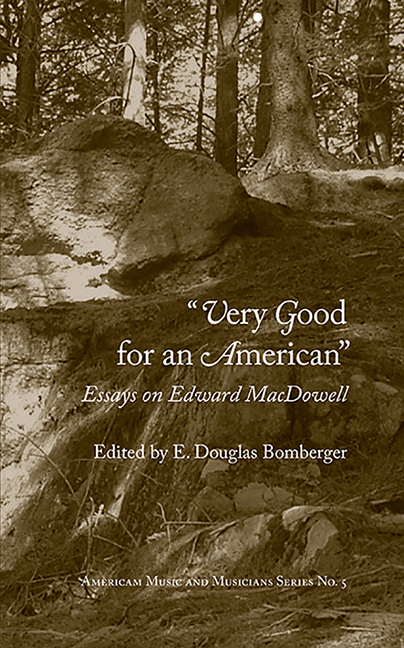Book contents
- Frontmatter
- Table of Contents
- Illustrations
- Contributors
- Acknowledgments
- Introduction: MacDowell at 150
- Edward MacDowell and the Society of Friends
- Historical Concerts in New York City, 1860-1876: An Approximation
- “No MacDowell, No Carreño”: Teresa Carreño's Contributions to the Dissemination of Edward MacDowell's Piano Music
- MacDowell, Liszt, and the Symphonic Tone Poem
- Wagnerian Influence and Motives in the Works of Edward MacDowell
- “On Sundays there was the music …” George Whitefield Chadwick between symphony and organ
- MacDowell vs. Butler: The “Idealist” Professor and the Administrator of “Materialism”
- Parallels in the Careers of Edward A. MacDowell and Chou Wen-chung
- American Bayreuth: The 1910 Peterborough Pageant and the Genesis of the MacDowell Colony
- Selective Bibliography
- Index
MacDowell vs. Butler: The “Idealist” Professor and the Administrator of “Materialism”
- Frontmatter
- Table of Contents
- Illustrations
- Contributors
- Acknowledgments
- Introduction: MacDowell at 150
- Edward MacDowell and the Society of Friends
- Historical Concerts in New York City, 1860-1876: An Approximation
- “No MacDowell, No Carreño”: Teresa Carreño's Contributions to the Dissemination of Edward MacDowell's Piano Music
- MacDowell, Liszt, and the Symphonic Tone Poem
- Wagnerian Influence and Motives in the Works of Edward MacDowell
- “On Sundays there was the music …” George Whitefield Chadwick between symphony and organ
- MacDowell vs. Butler: The “Idealist” Professor and the Administrator of “Materialism”
- Parallels in the Careers of Edward A. MacDowell and Chou Wen-chung
- American Bayreuth: The 1910 Peterborough Pageant and the Genesis of the MacDowell Colony
- Selective Bibliography
- Index
Summary
On Wednesday, February 3, 1904, the Evening Post broke the story that Edward MacDowell was abruptly resigning from his position as the head of the music department at Columbia University, citing his inability to “obtain the reorganization of work which he thinks necessary.” The story, which ran with bold headlines on the front page of the evening paper, included a transcript of an interview with MacDowell, which had presumably taken place earlier that day. In the interview, MacDowell faulted the University administration, specifically President Nicholas Murray Butler, for refusing to put into effect his ideas for developing a Fine Arts division at Columbia. He called the study of the fine arts at the University “poor” and lamented that the majority of graduates from the school were not even aware what constituted the fine arts. He declined to speak further on the subject until his resignation and a detailed report of his criticisms could be formally presented to the Board of Trustees. Butler, however, did not seem interested in the composer's report. “Professor MacDowell's declarations,” the article reported, “were laid before President Butler this afternoon…. The President declared that he did not consider them important, and had nothing to say.” The story quickly spread from coast to coast: Butler and Columbia were put on the defensive, and in turn, MacDowell was forced to respond repeatedly in the press. “The Columbia Wars,” as some would later refer to the newspaper sparring, continued for weeks and negatively impacted both MacDowell's and the University's images. The controversy also reignited a debate concerning music in university curricula, offering an important glimpse into the development of music as an academic subject.
Eight years earlier, in 1896, MacDowell had been appointed the first professor of music at Columbia University. At the time of the appointment, the university lauded him as “the greatest musical genius this country has produced.” That spring, MacDowell began building the music program, designing courses in history, theory, and composition as well as establishing the University Orchestra, directing multiple choral ensembles, and undertaking other administrative tasks.
- Type
- Chapter
- Information
- Very Good for an AmericanEssays on Edward MacDowell, pp. 143 - 162Publisher: Boydell & BrewerPrint publication year: 2017

